SEND and Inclusion
Our Therapeutic and Inclusion Practice
Our therapeutic culture is woven through every aspect of school life. Psychologists, psychotherapist, occupational therapists, speech and language therapists and send specialists work alongside teachers to create safe responsive and adaptive learning environments.
Our SEND and Inclusion provision is at the heart of our school. Every student receives personalised support designed to meet their unique strengths and challenges. We combine specialist teaching, therapeutic support and a differentiated curriculum to ensure every student can learn, grow and achieve. Our experienced team works closely with families and external professionals to create a safe, inclusive and nurturing environment where every student feels valued and empowered to succeed.

By combining therapeutic input from psychologists, psychotherapists, speech and language therapists and occupational therapists with adaptive teaching and specialist SEND input, we create learning environments where students can develop skills, independence and resilience, preparing them for life beyond school.
Always fulfilling our obligations under the Independent School Standards (2014) and SEND Code of Practice (2015), whilst taking student and parent/carers’ voices, EHCP outcomes and the Equalities Act (2010) into consideration, our school leadership makes professional judgements about the curriculum offer, adaptations and support that most appropriately meets students’ individual needs

We use evidence informed approaches that promote emotional regulation, communication, positive relationships and resilience including:
Trauma-Informed practice
Our school has been creating safety, trust and belonging through trauma informed practise and a consistent culture of care, supported by a highly skilled multidisciplinary team for several years.
We adopted Trauma Informed Schools UK (TISUK)’s evidence-based approach to building relationships that heal minds, brains and bodies. As a trauma informed school, we apply the principles of neuroscience, particularly Panksepp’s emotional systems and the PRRR model, to build secure attachments, promote prosocial chemicals, such as dopamine and oxytocin, and reduce toxic stress from excess noradrenaline and cortisol. Developing our relational framework has benefited our whole school community, making us a genuinely trauma-informed organisation.
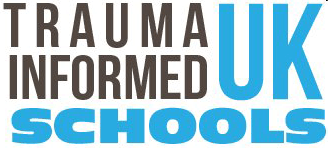
The National Autistic Society’s SPELL Framework
At Raise Education & Wellbeing School, we use the Autism Society’s SPELL framework to guide our support for autistic students. SPELL stands for Structure, Positive approaches, Empathy, Low arousal and Links. It underpins every aspect of our teaching and pastoral provision. We provide predictable and well-structured environments, clear routines and consistent expectations to help students feel safe and confident. Staff adopt positive approaches and empathetic understanding, responding to behaviour as communication. Learning spaces under interactions are designed with low arousal principles to reduce stress and sensory overload and we build strong links with families, therapists and wider community to ensure continuity and coherence of support. By embedding spell into our curriculum, teaching and well-being strategies, we help autistic students engage, achieve and thrive both academically and socially.
Our team are supported by our Occupational Therapist and SENCo, who leads our physical and sensory curriculum.
The Thrive Approach®
Developed over the past 25 years; the Thrive Approach® is a dynamic, development and trauma-sensitive approach to understanding the emotional and social needs that students’ behaviour may be signalling. Grounded in established neuroscience, attachment theory and child development, the Thrive Approach also draws on experiences from social work, psychotherapy and education.
At Raise Education & Wellbeing School, our Thrive approach is central to supporting students social emotional and mental health (SEMH). It helps students develop confidence, resilience and self-regulation, equipping them with the emotional skills they need to engage fully with learning and life.
Thrive support can be delivered one-to-one or in small groups. Grouped sessions are based on individual cognitive and social abilities so students feel comfortable with their peers. In whichever format, our Thrive practitioners promote and deliver learning and support that equips students to regulate their emotions, to ‘just be’ and to settle down to learn, making progress in the classroom and beyond. Through a combination of individual, small group and whole class interventions, or trained practitioners assess each student’s emotional needs and provide tailored support. Thrive is embedded across all curricula, pastoral care and outreach programmes, ensuring that well-being underpins every aspect of school life will stop by fostering emotional literacy, positive relationships and self-awareness, thrive enables students to overcome barriers, make progress academically and thrive socially and personally.
Thrive is overseen by our Assistant Head of School and is delivered by several trained members of our team, including SENCo’s, Snr Teachers, Intervention Practitioners and Teaching Assistants. Every form group has a Thrive Practitioner attached to it, ensuring that all students benefit.

PACE
The PACE (Play, Acceptance, Curiosity, Empathy) parenting model was created by Dan Hughes, a clinical psychologist specialising in the treatment of children who have experienced abuse and neglect. PACE is a way of thinking, feeling, communicating and behaving that helps a child feel safe. It promotes secure attachments and enables people to reflect on their thoughts and behaviours without being judged.
We use the PACE principles to help students who are experiencing difficulties, to lower barriers can start to look at themselves and let others start to see them; get closer emotionally and start to trust.
At Raise Education & Wellbeing School we have invested heavily in training, resources, time and planning to embed our emotionally available adult and PACE approaches to listening to young people and supporting them in times of need.
Restorative Practices
Raise Education & Wellbeing School takes a restorative approach to resolving conflict and preventing harm. Our whole-school approach to restorative methods has seen many benefits including increased attendance, reduced exclusions and improved achievement. It is an effective approach to reducing classroom disruption, truancy, antisocial behaviour and interpersonal disputes. A Department for Education report showed that 97% of school surveyed rated restorative approaches as effective in for preventing bullying.
We have received whole-school training from Restorative Justice 4 Schools.
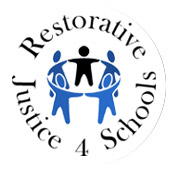

Positive Behaviour Support
Our team have been trained to follow the Positive Behaviour Support (PBS) framework, by the Association for Psychological Therapies (APT). PBS is a widely used and person-centred approach to identifying and meeting a student’s support needs, when they are distressed and at risk of harming themselves or others. By working with the student and their networks, we can assess the potential impact that environment and other factors play in causing distress. We then create bespoke plans to develop schedules or interventions that improve their wellbeing, reducing anxieties.
We continually review and improve plans to help to reduce the potential for crises and upset.
Read more here.
Team Teach (positive behaviour framework)
Team Teach is accredited, award-winning professional development training in positive behaviour support and behaviour de-escalation. Team Teach places the individual at the centre of every decision and allows for the safe and respectful management of distressed behaviours and conflicts. It is a framework that ensures that our team are equipped with strategies to de-escalate challenging situations thus limiting the need for physical intervention. Within our school we have two fully qualified Team Teach Trainers who run regular training sessions for our whole school team.
Specialist therapies
For students who benefit from targeted interventions, our specialist therapies provide creative and experiential routes to recovery, self-expression and growth. Our skilled team assess the appropriateness of therapies which are delivered by qualified and experienced practitioners, individually or in small groups and include:
Tailored Therapeutic Offer
Where a more bespoke, professional intervention is required our SENCos assess the need and, where appropriate, liaise with parents/carers and external mental health services, such as CAMHs. The school also has an in-house psychological service where students can be referred for therapy with a qualified psychologist or psychotherapist on a one-to-one basis. Students may also be referred to our one-to-one and small groups Art Therapy and Wilderness Therapy (Wild Passport) sessions.
Our in-house Psychology Services utilises several therapeutic approaches including,
Psychotherapy, Person Centred Therapy, Cognitive Behaviour (CBT) approaches, Acceptance and Commitment Therapy (ACT), Compassion focused Therapy (CFT), Mindfulness, Motivational interviewing (MI), Play Therapy and Art Therapy
Within our team we have qualified Autism and ADHD assessors. This helps with the early identification of relevant traits, to ensure our approach and curriculum meets the needs of all students.
Our psychologists and psychotherapists offer advice, guidance and CPD to the school team, to ensure a consistent and informed approach when supporting our students.

Wilderness Therapy
Wilderness Therapeutic sessions are run by our qualified Wilderness Therapist at our bespoke allotment. It supports attendance and engagement for students who benefit from outdoor learning and experiences. Sessions typically follow the WILD Passport curriculum, which captures 125 learning outcomes over five separate competencies.
The combination of therapeutic interventions and experiential learning, builds self-awareness, self-efficacy and resilience. Underpinned by our relational ethos it develops communication, social interaction and emotional regulation skills, fostering a sense of belonging.
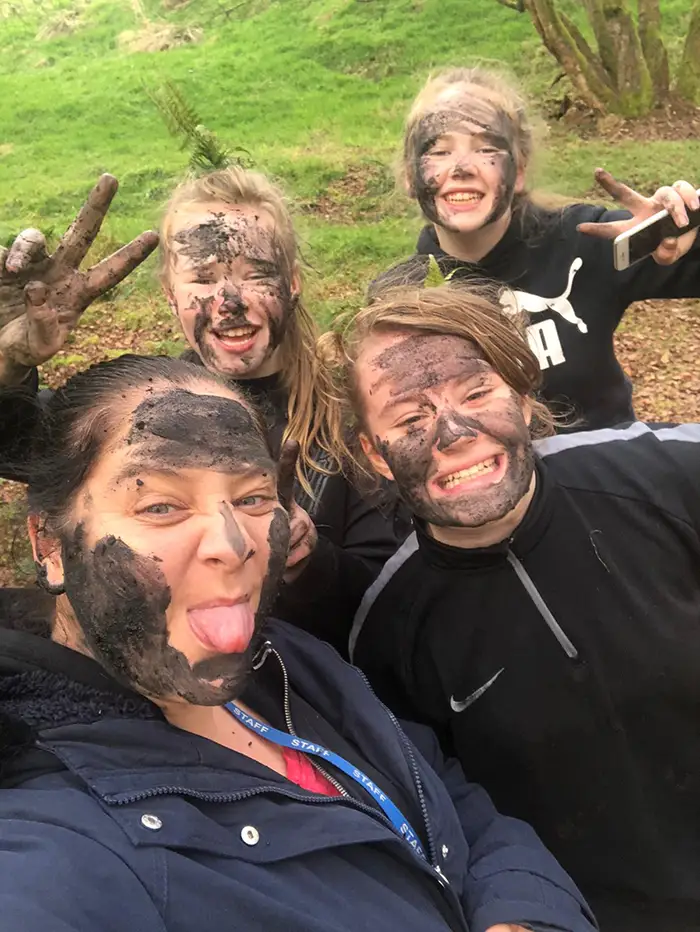

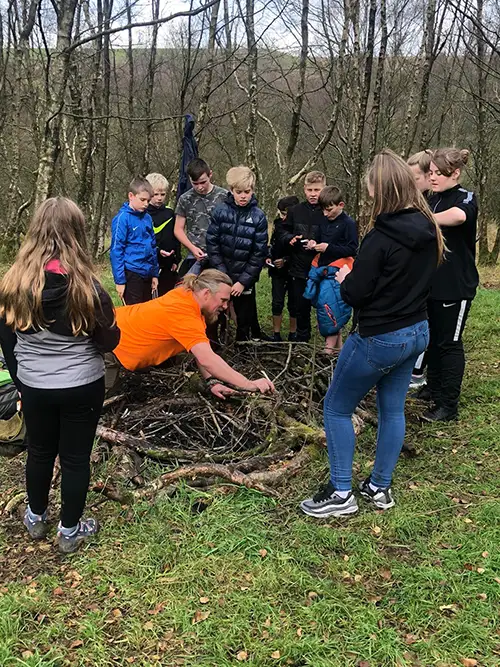

Therapeutic Horticulture
We are fortunate to have an allotment where our students learn horticulture, the art and science of growing fruit and vegetables. They benefit from being in nature and developing their social and communication skills. Research has demonstrated that involvement in gardening activities can reduce stress, anxiety and depression. For some young people, it also opens up a career pathway
Play Therapy
Play therapy provides a safe and structured space where students can express thoughts and emotions that might be difficult to put into words. Through symbolic play, storytelling, role play, sand tray work and creative materials students can process trauma, loss, anxiety and relationship challenges in a contained supportive environment. Play therapy is particularly powerful for those whose emotional development may differ from their chronological age or who find traditional talking therapies overwhelming. It helps students develop self-understanding, build trust and restore a sense of control and safety.
Psychotherapy
Delivered by qualified psychopath psychotherapists with expertise in child and adolescent mental health, attachment and trauma recovery. Psychotherapy provides a confidential space for students to make sense of experiences, relationships and emotions that may feel confusing or overwhelming stop sessions may draw on integrative psychodynamic or trauma focused approaches depending on need and developmental stage. I was psychotherapist also collaborate with teaching and pastoral teams to embed therapeutic understanding into daily school life, ensuring continuity of care and emotional safety beyond the therapy room.
Access is determined through our multidisciplinary assessment process to ensure that any intervention is safe, appropriate and matched to the student’s readiness and needs. Our team carefully considers developmental stage, emotional capacity and presenting issues before recommending individual psychotherapy as alternative approaches may be more beneficial.

Art therapy
Our Art therapy is delivered by a qualified art psychotherapist and helps our students to express their feelings through creative activities like drawing and painting It provides a safe space to explore emotions, reduce stress and build confidence. By using art to communicate experiences that can be hard to put into words, students can gain insight, develop coping skills and feel more in control of their emotions.
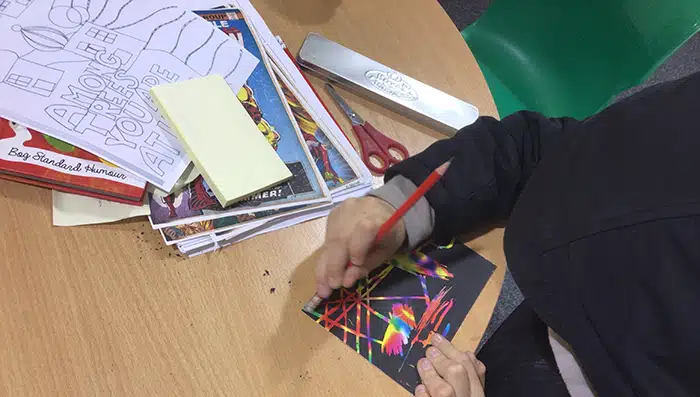

Producing artwork for therapeutic purposes can be a great way to express difficult emotions and explore past events in a safe and structured way. Art therapy is tailored to each group or individual and supports personal growth, emotional well-being and positive connections with learning and others.
Therapeutic Music
Many of our students have found great joy in listening to, and creating, music. Writing lyrics has helped them with literacy skills and enabled them to articulate and process difficult emotions. It has helped many students with communication and social interaction.

Therapy dogs
Many of our students love spending time with our wonderful therapy dogs. There a several health benefits: lowering blood pressure and stress levels, increasing levels of dopamine and serotonin, decreasing anxiety and boosting mood, improving social isolation and facilitating communication and generally improving physical and mental well-being.

Adaptative Teaching and SEND Expertise
Our staff are specialists in understanding and responding to a wide range of special educational needs, including autism, ADHD, social, emotional and mental health needs, communication difficulties and sensory processing differences.
We use adaptive teaching and therapeutic strategies that match each student’s profile, combining professional insight with strong relationships and consistent routines. The multidisciplinary team collaborates, through the circle of adults to review progress and adapt support so that learning remains engaging, challenging and achievable for all.
Assessment, review systems & processes
Assessment is an ongoing, collaborative process that informs all aspects of teaching and therapeutic sport. Teachers and therapists work together to understand each student starting point, track progress and plan next steps across academic, social, emotional and behavioural domains.
We use a combination of standardised tools, teacher observations and evidence based digital systems, including:
- IDL literacy and numeracy
- Snap-B and Outcome Stars
- Thrive assessments and EHCP reviews
Assessment findings are used dynamically to adapt teaching, shape interventions and inform each students assess plan do review cycle. This ensures that support is purposeful, proportionate and aligned to each student’s developmental stage and needs.
Assessment
Teacher assessment
In brief, our teachers carry out two main forms of assessment:
‘Formative’ assessment. At Raise, formative assessment is at the heart of teaching and learning. Teachers continuously check understanding through observation, questioning and small tasks, allowing them to adapt lessons in real time to meet students’ needs. This ongoing assessment ensures gaps are addressed promptly, strengths are extended, and learning is personalised helping every student make steady, meaningful progress, enabling next steps to be planned.
‘Summative’ assessment is carried out towards the end of each term. Our school uses a combination of tests, projects and formal reviews to measure learning in literacy, numeracy and wider subjects as well as social, emotional and personal development. The results inform future planning, celebrate achievements, and ensure each student stays on track to reach their full potential.
Software Assessment
Raise Education & Wellbeing School invests in an array of leading software applications to assess and monitor students’ academic progress, social emotional wellbeing, behaviour patterns and readiness to learn. This rich insight and identification of emerging needs, enables teachers, SENCo’s, intervention practitioners and therapist to plan targeted interventions, adjust support and celebrate growth over time. Regular reviews with families ensure that progress is transparent and every student remains supported, stretched and valued.


Literacy Assessments and Interventions
Lexia
Lexia can be used at Wave 123, supports 5 key areas of literacy – Phonological Awareness, Phonics, Fluency, Comprehension, Vocabulary – and features printable and online activities.
Lexia’s ‘Assessment Without Testing’, assessment technology is embedded across our curriculum. It gives us actionable, real-time student progress data without interrupting the flow of the lesson or creating anxiety around testing Assessment. The data enables our teachers to understand students’ current skill levels and create data-driven action plans.
Rapid Reading Plus
Rapid Reading Plus is a complete reading course for rapidly improving students’ comprehension and fluency. It uses specifically designed, dyslexia-friendly font and age-appropriate content with real-life topics, to support students working at below Age-Related Expectations.
Learn more about Rapid Reading Plus
Lucid Exact
Provides baseline scores for:
- Speeded word recognition and accuracy
- Reading comprehension
- Reading speed
- Spelling
- Handwriting speed
- Typing speed
Simple and efficient screening to identify students entitled to exam access arrangements.
This data enables our SENCo’s and teaching teams to create Individual Learning Plans (ILP’s) and targets.
Secondary Language/Speechlink
Secondary Language Link is the only comprehensive SLCN support package of its kind. Includes assessment, targeted interventions and teacher training which we use to identify and support the language and communication needs of Key Stage 3 students.
IDL-Literacy Software
Can be used at Wave 123
The IDL Literacy intervention software is a speaking-computer based multi-sensory reading and spelling intervention. It has proven success in dramatically increasing reading and spelling ages for students with dyslexia and/or low-level literacy ability.
DASH
DASH (The Detailed Assessment of Speed of Handwriting) is ideal for providing evidence for Access Arrangements for General Qualifications. It can also play a role in identifying students with handwriting difficulties and provides relevant information for planning interventions.

Numeracy Assessments and Interventions
MyMaths
MyMaths is an online platform, written by teachers for teachers and their students. It offers everything needed to teach mathematics, enthuse students and provide a strong foundation for other maths-related subjects.
The interactive lessons cover all areas of the curriculum, using a range of teaching tools that break down and illustrate key numerical concepts. Lessons help to consolidate mathematical skills and build a strong foundation for maths-related subjects. The application enables our SENCo’s and teachers to monitor progress and implement the Waves of intervention approach.
IDL Numeracy
IDL Numeracy is a maths software resource that helps to improve the ability of low-attaining learners in mathematics. Lessons in IDL Numeracy ensure inclusivity by reducing the stress students with dyscalculia would ordinarily feel when faced with mathematical problems. After a few hours using IDL Numeracy, students will find a familiarity with the lessons, and because the lesson mechanics remain the same, they gain the confidence they need to tackle problems, even those they have never encountered before.

Monitoring EHCP progress
At Raise we have an innovative form around the student approach, which means that each student has a dedicated Form Teacher, SENCo and School Social Worker. The form bubbles also consist of teachers/tutors, Snr Intervention Practitioners, TA’s and Intervention support. This process, along with our data systems, enables the SENCo to gain a holistic, in-depth understanding of each student’s needs, progress and any adaptation required. It also high lights any barriers or challenges that students may be facing that affect their attendance, engagement, progress or attainment. In our approaches, no student is forgotten or left behind.
Our SENCo’s lead interim and annual review meetings. These meetings are an important way for students, parents/carers, school and professionals to assess the continued effectiveness of the provision set out in the student’s EHCP (Education, Health and Care Plan). The meeting discusses the student’s progress, celebrates achievements and addresses any barriers to learning. The EHCP is reviewed, including identifying strengths and needs. Learning priorities, strategies and support needs are agreed between students, parents/carers and SENCo’s, wherever possible.
Reporting & celebrating
A strong partnership between parents/carers and the school is vital to help students to make the best progress and to benefit from all the opportunities the school has to offer. Our ethos of care and relational approach also extends to parents/carers. The capturing of parents’ voices forms and essential part of the school’s approach. Regular home/school contact is made by form teachers, SENCo’s and our family liaison practitioners.
Parents are also invited to annual EHCP review meetings, to the schools’ parents evening (in person or online) We also provide progress and attainment reports, so parents are aware of areas where the student is excelling, and areas they are working on.
